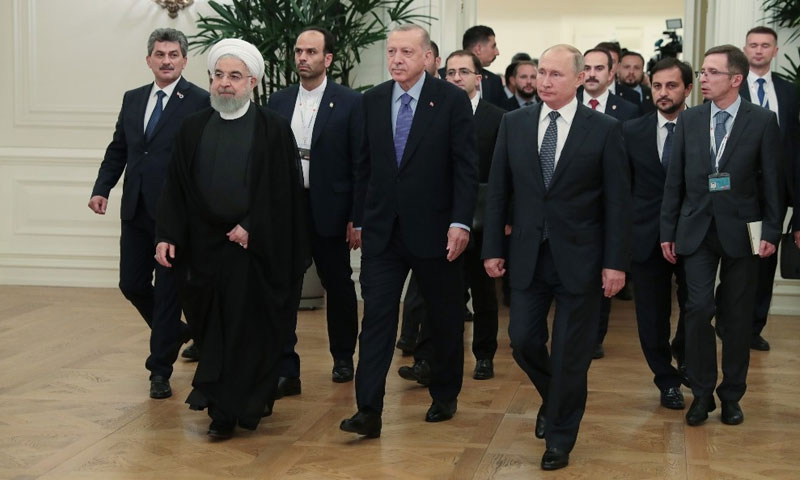The political process is marking a new shift in Syria after the leaders of the guarantor countries of the “Astana” talks _ Recep Tayyip Erdogan of Turkey, Vladimir Putin of Russia and Hassan Rouhani of Iran_ made an implicit declaration that a final agreement has been reached on the formation of the Constitutional Committee, which is supposed to draft a new constitution for Syria, paving the way for presidential and parliamentary elections under the auspices of the United Nations (UN).
The three-sided declaration was made after one year and a half long meetings and talks in the UN halls, with the Syrian regime’s recurrent attempts to disturb the formation of the committee, protesting repeatedly against the names of the participants, especially those enlisted by the UN, before being subjected to the pressure of its Russian ally, according to Yahiya Aridi, the spokesman of the Syrian High Negotiations Committee (SHNC) —an umbrella body created to represent the Syrian opposition.
Aridi confirmed to Enab Baladi that the disagreement was rooted in the number of names and that the UN asked each side to suggest two names of the committee members. Twelve names have been proposed. Then, the UN Special Envoy to Syria Geir Pedersen will select six of them by consensus, pointing out that the disclosure of the names is one of the UN’s privileges.
Official announcement put off
Despite the positive talk that accompanied the tripartite summit held in the Turkish capital Ankara between the leaders of the guarantor countries on Monday, September 16, as well as their emphasis that the names’ problem has been resolved besides agreeing on all procedures and rules governing the work of the committee, the leaders did not make an official announcement of formation, leaving the task to the UN Envoy, seeking to bestow the committee with an international character under the auspices of the UN and eliminate the impression that its formation is limited to the Astana’s three guarantor countries.
The formation of the committee, its working mechanisms and the rules governing its work were supposed to be officially announced in a briefing by Pederson to the UN Security Council on Syria on September 19. However, Pederson requested a postponement of the scheduled session for September 30; until he is back from Damascus, where he is to meet the Syrian Foreign Minister Walid al-Moallem next Monday.
Aridi believes that the Syrian regime probably wants to save its face, being pressured by Russia to agree on the formation of the committee. Therefore, the regime delayed Pederson what prompted the latter to postpone his briefing in the Security Council. The Constitutional Committee’s formation is expected to be announced on the Security Council’s next session on Syria.
Fears of next step
What is the next step following the formation of the committee? A question that Syrians are raising after two years of procrastination in the formation of the committee, amid fears that the regime and its allies might try to hinder the work of the committee to gain time.
Speaking to Enab Baladi about the next phase, Aridi said that the first step is to convene the committee, discuss the procedural rules agreed upon and set up those to govern the committee’s work and its internal order. Further, there will be periodical meetings for a small group of 45 names, who are experts in drafting a constitution, in addition to appointing a co-chairmanship consisting of the SHNC and the Syrian regime to begin the work of re-writing the constitution according to a schedule.
About the concerns over the regime’s procrastination, Aridi affirmed that the duration of the Constitution’s creation, according to the international resolutions, is six months. Nevertheless, the SHNC is aware that the Syrian regime does not want a constitutional process nor a political solution and will try to impede them. Besides, if the regime gives its consent to the work of the committee, this will happen due to Russian pressure.
Moreover, Aridi stressed, “if the committee does not carry out its work within six months, the situation will be chaotic,” and may drive countries to search for other alternatives, especially since France, during the meeting of the small group held on September 12, proposed a shift to holding elections because the committee’s formation was being hampered. But the SHNC considered it unlikely to hold elections under the current circumstances.
The voter turnout could hinder the work of the committee, as any article, to be passed or disabled, needs 113 votes out of 150, which consist the total number of the committee’s members, as Aridi explained. Additionally, he highlighted that roughly 23 articles in the constitution could cause many problems, which are linked to the presidential prerogative. In case, a dead-end is reached with the Syrian regime, the referentiality would turn to the UN and the international resolutions, as to exert pressure on the regime.
Aridi indicated that the political solution in Syria does not lie in establishing, declaring or convening the Constitutional Committee. It is a matter of implementing the international resolutions, which do not include only the issue of the Committee, but there are other items. In particular, it cannot be agreed on any item in the international resolutions until all items are approved, which are to create a safe environment for elections and find a transitional political body.

